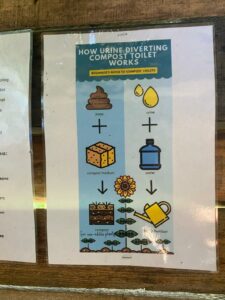Closing the Loop – Compost Toilets
Using cow manure in agriculture does not sound that strange, right? But what about human feces? Like cow’s manure, human feces contain many nutrients that can help to build thriving soil. Therefore; Keep poop in the loop!
To close this loop, there are two compost toilets installed at the Vegetarium project.
In the quest for sustainable living and eco-friendly practices, compost toilets are one of the most basic solution to cut back on water use and help to keep the nutrients in the loop. These toilets are an alternative, resource-conserving method for waste management.
What Are Compost Toilets?
Compost toilets are also known as dry toilets and are an environmentally friendly way for human waste disposal. Unlike traditional flush toilets that use water to get rid of the waste, compost toilets work by promoting the natural process of decomposition. These toilets separate liquid and solid waste, allowing the solid waste to break down into nutrient-rich compost.
How Do Compost Toilets Work?
- Separation of Waste: Compost toilets typically feature a design that separates liquid and solid waste. This separation is crucial for optimising the composting process
- Ventilation System: Compost toilets are equipped with a ventilation system that helps control odour and facilitate the aerobic decomposition of waste. This system ensures the right conditions for beneficial bacteria to thrive. The compost toilets at Vegetarium are built in such a way that the wind can blow through it, ensuring enough aeration.
- Composting Chamber: The solid waste is collected in a composting chamber, often containing organic materials like sawdust or coconut coir to aid in the decomposition process. Over time, the waste breaks down into compost, which can be used as a nutrient-rich fertiliser for plants.
Benefits of compost toilets
- Water Conservation: One of the most significant advantages of compost toilets is water conservation. Traditional flush toilets use a considerable amount of water with each use. Compost toilets eliminate the need for water in waste transportation, helping conserve this precious resource
- Reduced Pollution: Traditional sewage treatment plants require a substantial amount of energy and chemicals to process and treat wastewater. Compost toilets, on the other hand, reduce the pollution associated with sewage treatment and minimise the environmental impact of nutrient-rich effluents entering water bodies
- Nutrient Recycling: The compost produced by these toilets serves as a valuable resource for enriching soil fertility. By recycling nutrients from human waste, compost toilets contribute to sustainable agriculture.
- Off-Grid Living: Compost toilets are an ideal solution for off-grid living situations or in areas where access to conventional sewage systems is challenging. With compost toilets you don’t need centralised infrastructure and are they well-suited for remote locations
- Low Maintenance Costs: Lastly, compost toilets generally have lower maintenance costs compared to traditional sewage systems.
All in all, compost toilets are a good solution if you want to live a bit more sustainable, have the opportunity to have an outside toilet and if you live in a remote area. Oh and those of you wondering about the smell… it is really not that bad. We use a compost medium (often sawdust) that almost eliminates all of the bad smells and make the compost more cellulose rich, win-win.
Written by Camil






